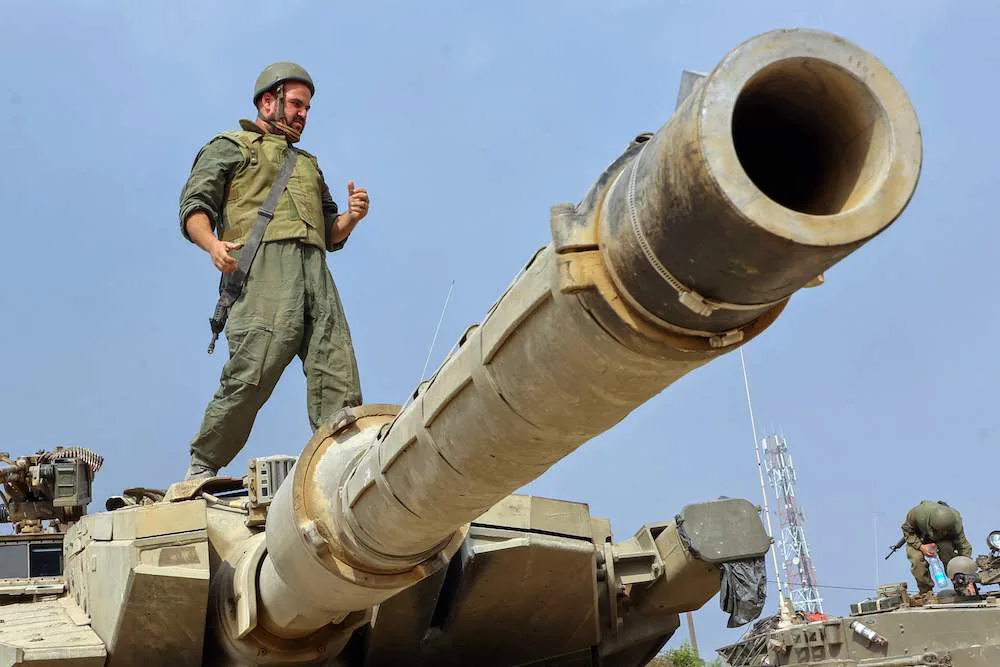
In Israel, they continue to target places in Gaza that belong to Hamas, and many parts of the city are destroyed. Israeli soldiers are also finding more victims in towns that were damaged by the fighting, even five days after the militants’ attack.
The army has found a large number of bodies, about 1,200, most of whom were not armed and were civilians. At the same time, Gaza officials have reported that more than 1,000 people have been killed because of Israel’s intense air and artillery attacks in the crowded Palestinian area.
In response to the attack by militants, Israel has gathered its forces, including tanks and heavy vehicles, around Gaza. Prime Minister Benjamin Netanyahu has described this attack as extremely brutal, comparing it to the Holocaust.
US President Joe Biden has promised to send more weapons and military equipment to Israel, which is a close ally of the United States. He has expressed strong disgust for the killing of innocent civilians in the unusual attack initiated by Hamas starting on Saturday.
There is significant worry in Israel about the well-being of around 150 hostages. Most of them are Israelis, but some are foreign or have dual nationality. They are being held in Gaza by Hamas.
Hamas has claimed that four of the hostages were killed in Israeli airstrikes and has threatened to harm other hostages if Israel bombs civilian areas without giving advance warning.
People are increasingly concerned about the deteriorating humanitarian situation in Gaza, which has been severely affected by the ongoing conflict. Israel has destroyed more than 1,000 buildings and has imposed a complete blockade, which means that essential supplies like water, food, and energy are cut off from 2.3 million people in the region.
More than 260,000 people in Gaza have been forced to leave their homes, according to a UN aid agency. The European Union has called for the creation of a “humanitarian corridor” to help civilians escape from this being the fifth war in Gaza in the past 15 years.
Israel is getting ready for a possible ground invasion of Gaza, but they also face the threat of a multi-front war because they’ve been attacked with rockets by militant groups in neighboring Lebanon and Syria.
On Wednesday, Israel carried out more strikes in southern Lebanon, an area controlled by Hezbollah, which is an ally of Iran, a country that Israel considers its arch-enemy.
Israel
Israel has been deeply affected by the deadliest attack in its 75-year history. There was also an intelligence failure that allowed over 1,500 militants to break through the security barrier in Gaza in a coordinated attack by land, air, and sea, which happened during the Jewish Sabbath.
Hamas fighters entered small towns and kibbutzim and killed residents who were hiding in their homes or trying to defend their communities.
Israeli forces have regained control of more than a dozen southern towns near Gaza after tough street battles that resulted in the bodies of at least 1,500 Hamas militants lying in the streets.
An army spokesperson, Jonathan Conricus, mentioned that they have found dead Israelis in communities where Hamas infiltrated and carried out attacks. The death toll among Israelis is around 1,200, with most of them being civilians. The army has also reported that 169 Israeli soldiers have lost their lives.
Israeli troops have encountered and killed several remaining Hamas militants. According to Daniel Hagari, a military spokesperson, they killed 18 terrorists in the past day.
Israel has called up 300,000 reservists for what Prime Minister Netanyahu has described as a “long and challenging” war.
Intense fighting is ongoing in Gaza, with the air force conducting hundreds of overnight strikes, resulting in at least 30 casualties, according to Hamas.
Gaza City is now covered in rubble, with burnt-out cars and broken glass on the streets. The Israeli airstrikes have hit various targets, including the Hamas-linked Islamic University, residential buildings, mosques, factories, and shops, causing widespread destruction.
A Gaza resident, Mazen Mohammad, described how his family spent a terrifying night huddled on the ground floor of their home as explosions shook the area. When they emerged in the morning, they found their neighborhood devastated, making them feel like the only survivors in a ghost town.
The Israeli army reported that fighter jets have also destroyed a Hamas system used to detect anti-aircraft threats and targeted 80 Hamas sites in the northern Beit Hanoun area. Among these sites, two banks were hit, which were allegedly used for financing terrorism.
In Gaza, medical supplies, including oxygen, were running low at the overwhelmed Al-Shifa hospital, according to Dr. Mohammed Ghonim, who works in the emergency room.
In the occupied West Bank, there has been unrest, and 15 Palestinians have been killed since Saturday. Protests have taken place in solidarity with Gaza.
Some Israeli cities have become strangely quiet and tense, with residents expressing a growing sense of fear and distrust between Jewish and Arab-Israeli communities.
A coffee vendor in Ramallah, Farah Al-Saadi, said, “Throughout my entire life, I have seen Israel take our land, arrest our children, and kill us. He praised the actions of Hamas.
Ahmed Karkash, a shopkeeper in the Old City of Jerusalem, expressed that both Israelis and Arabs are afraid of each other, leading to a general atmosphere of fear and mistrust.
